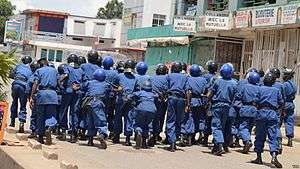Law enforcement in Burundi

The principle law enforcement agency in Burundi is the National Police of Burundi (French: Police Nationale du Burundi, PNB). The police falls within the jurisdiction of the Ministry of Community Development and Regional Administration.[1] The PNB was founded in 2004, following the end of the Burundian Civil War and the Arusha Accords. Its stated objectives are the maintenance of public order, the protection of the population, and the fight against organised crime.[2] Burundi has been a member of INTERPOL since 1970.[3] Burundian police have been deployed abroad as part of United Nations (UN) operations in Africa.[4]
The PNB is divided into missions, dealing with separate areas as well as five regional commissariats. The different services include:[2]
- Internal Security Police (Police de sécurité intérieure)
- Judicial Police (Police judiciaire)
- Air Police (Police de l'Air)
- Border and Aliens Police (Police des frontières et des étrangers)
- Prison Police (Police pénitentiaire)
According to Transparency International, in 2014 over 80 percent of Burundians believed that there was corruption within the police service. The Burundian government has tried to resolve the corruption problem with the aid of foreign assistance from countries including the Netherlands.[2] Although little effective citizen oversight exists, there is theoretically a police ombudsman and attorney general, both tasked with dealing with complaints against police.[1]
During the popular unrest in Burundi since 2015, the police have frequently been used to suppress anti-government protests. Police violence against protestors, both in the form of beatings and shootings, was particularly criticised by Human Rights Watch.[5] As a response, in 2016, the UN decided to repatriate 280 Burundian police from the MINUSCA mission in the Central African Republic because of the police that had been accused of brutality in Burundi before their departure.[4] Burundi also refused an offer by the UN Security Council to deploy 288 UN police officers to Burundi in August 2016.[6]
In five months, from spring to the end of summer of 2018 Burundian security forces allegedly murdered.226 people. Human rights organizations say they recorded29 cases of sexual assault, 35 enforced disappearances, 144 cases of torture and 694 arbitrary arrests during the period. [7] In October 2017, the International Criminal Court approved an investigation into misconducts in Burundi since April 2015. The first session of the examination was opened in April 2016.[8] On October 27, 2017, Burundi pulled out from the court but the court is still open over crimes committed in Burundi prior to that date.[9]
References
- 1 2 African Policing 2008, pp. 12-3.
- 1 2 3 Transparency International 2014, p. 4.
- ↑ "Burundi". Interpol. Retrieved 19 November 2016.
- 1 2 "RCA : 280 policiers burundais suspendus". BBC Afrique. 4 June 2016. Retrieved 19 November 2016.
- ↑ "Burundi: Deadly Police Response to Protests". Human Rights Watch. 29 May 2015. Retrieved 19 November 2016.
- ↑ "Burundi rejects UN police force to help end violence". BBC. 3 August 2016. Retrieved 19 November 2016.
- ↑ Burundi: Over 200 Killed in Escalating Brutality in Burundi
- ↑ ICC: New Burundi Investigation
- ↑ Burundi: Renew UN Inquiry
Bibliography
- An Audit of Police Oversight in Africa. Cape Town: African Policing Civilian Oversight Forum. 2008. ISBN 978-1-920299-17-0.
- Étude sur les aspects de l’intégrité de la Police Nationale du Burundi (PDF). London: Transparency International (Defence). 2014. ISBN 978-0-9927122-2-8.